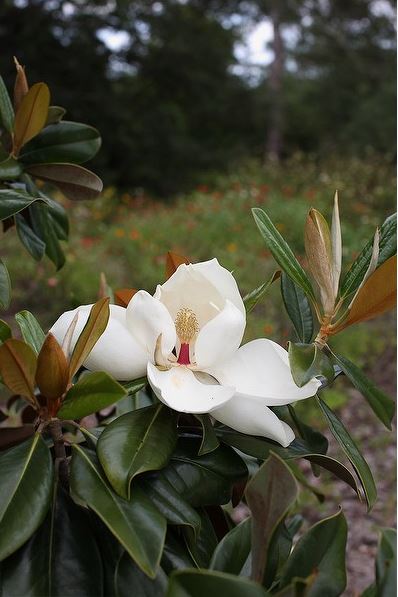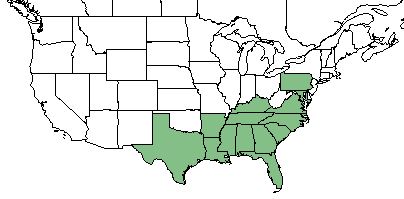Difference between revisions of "Magnolia grandiflora"
(→Taxonomic Notes) |
|||
| (19 intermediate revisions by 8 users not shown) | |||
| Line 1: | Line 1: | ||
{{italic title}} | {{italic title}} | ||
| + | Common name: southern magnolia,<ref name= "USDA Plant Database"/> bull bay<ref name=weakley>Weakley, A.S. 2020. Flora of the Southeastern United States. Edition of 20 October 2020. University of North Carolina at Chapel Hill, Chapel Hill, North Carolina.</ref> | ||
<!-- Get the taxonomy information from the NRCS Plants database --> | <!-- Get the taxonomy information from the NRCS Plants database --> | ||
{{taxobox | {{taxobox | ||
| Line 18: | Line 19: | ||
}} | }} | ||
==Taxonomic Notes== | ==Taxonomic Notes== | ||
| − | Synonyms: none | + | Synonyms: none<ref name=weakley/> |
| − | Varieties: | + | Varieties: none<ref name=weakley/> |
==Description== | ==Description== | ||
<!-- Basic life history facts such as annual/perrenial, monoecious/dioecious, root morphology, seed type, etc. --> | <!-- Basic life history facts such as annual/perrenial, monoecious/dioecious, root morphology, seed type, etc. --> | ||
| + | ''M. grandiflora'' is a perennial tree of the ''Magnoliaceae'' family native to North America and introduced to Puerto Rico.<ref name= "USDA Plant Database"> USDA Plant Database [https://plants.usda.gov/core/profile?symbol=MAGR4 https://plants.usda.gov/core/profile?symbol=MAGR4] </ref> | ||
| + | |||
==Distribution== | ==Distribution== | ||
| + | It is difficult to determine the natural range of ''M. grandiflora''. The pre-Columbian range was likely from southeastern North Carolina to peninsular Florida, then west to eastern Texas, staying mainly on the Coastal Plain. Now, due to naturalization and horticultural planting, its range has expanded northward and inland. It also grows in Puerto Rico.<ref name=weakley/> | ||
| + | |||
==Ecology== | ==Ecology== | ||
===Habitat=== <!--Natural communities, human disturbed habitats, topography, hydrology, soils, light, fire regime requirements for removal of competition, etc.--> | ===Habitat=== <!--Natural communities, human disturbed habitats, topography, hydrology, soils, light, fire regime requirements for removal of competition, etc.--> | ||
| − | < | + | ''M. grandiflora'' is found in suburban woodlands, maritime forests, mesic Coastal Plain bluffs and flats, bottomlands, now also widely naturalized, spreading from cultivation into wet to mesic (and even dry) forests.<ref name=weakley/> Specimens have been collected from the shores of freshwater springs, densely-wooded hammocks, sand dunes, mixed hardwood forests, wet bottomland hammocks, swamp borders, and lakeshores.<ref name = "FSU herbarium"> URL: http://herbarium.bio.fsu.edu. Last accessed: June 2018. Collectors: Loran C. Anderson, R.K. Godfrey, John Ogden, Patricia Elliot, Richard Mitchell, R. Kral, L.J. Brass, L.B. Trott, Karen MacClendon, Chris Cooksey, R. Komarek, Lisa Keppner, Ed Keppner, Cecil Slaughter, Shirley Wingfield, Elmer C. Prichard. States and counties: Florida (Gadsden, Volusia, Santa Rosa, Leon, Bay, Liberty, Jackson, Levy, Jefferson, Gadsden, Lake, Franklin, Highlands, Wakulla, Calhoun, Washington, Putnam) Georgia (Grady) Louisiana (Oachuita)</ref> |
| + | |||
| + | ===Phenology=== <!--Timing off flowering, fruiting, seed dispersal, and environmental triggers. Cite PanFlora website if appropriate: http://www.gilnelson.com/PanFlora/ --> | ||
| + | ''M. grandiflora'' flowers from April through July<ref name= "PanFlora"> Nelson, G. PanFlora: Plant data for the eastern United States with emphasis on the Southeastern Coastal Plains, Florida, and the Florida Panhandle. www.gilnelson.com/PanFlora/ Accessed: 24 MAY 2018 </ref> and fruits from September through October.<ref name=weakley/> | ||
<!--===Seed dispersal===--> | <!--===Seed dispersal===--> | ||
<!--===Seed bank and germination===--> | <!--===Seed bank and germination===--> | ||
| − | |||
| − | |||
| − | |||
| − | |||
| − | ==Conservation and | + | ===Fire ecology=== <!--Fire tolerance, fire dependence, adaptive fire responses--> |
| + | ''M. grandiflora'' is fire resistant, but has a low fire tolerance;<ref name= "USDA Plant Database"/> despite this, populations have been known to persist through repeated annual burning.<ref>Platt, W.J., R. Carter, G. Nelson, W. Baker, S. Hermann, J. Kane, L. Anderson, M. Smith, K. Robertson. 2021. Unpublished species list of Wade Tract old-growth longleaf pine savanna, Thomasville, Georgia.</ref> | ||
| + | |||
| + | <!--===Pollination===--> | ||
| + | ===Herbivory and toxicology=== <!--Common herbivores, granivory, insect hosting, poisonous chemicals, allelopathy, etc.--> | ||
| + | ''Magnolia grandiflora'' has been observed to host ladybugs such as ''Harmonia axyridis'' (family Coccinellidae), plant bugs such as ''Lygus lineolaris'' (family Miridae), and assassin bugs such as ''Apiomerus crassipes'' (family Reduviidae).<ref>Discoverlife.org [https://www.discoverlife.org/20/q?search=Bidens+albaDiscoverlife.org|Discoverlife.org]</ref> | ||
| + | |||
| + | ===Diseases and parasites=== | ||
| + | A common beetle that can cause death at the tips of branches is the ''Xylosandrus campactus'', an ambrosia beetle.<ref name ="FFE">Observation by Craig Bateman comment on Brandi Missouri Griffith post, May 18, Valdosta Fl., posted to Florida Flora and Ecosystematics Facebook Group. </ref> | ||
| + | |||
| + | ==Conservation, cultivation, and restoration== | ||
| − | == | + | ==Cultural use== |
==Photo Gallery== | ==Photo Gallery== | ||
<gallery widths=180px> | <gallery widths=180px> | ||
</gallery> | </gallery> | ||
==References and notes== | ==References and notes== | ||
Latest revision as of 13:55, 15 June 2023
Common name: southern magnolia,[1] bull bay[2]
| Magnolia grandiflora | |
|---|---|

| |
| Photo by John B | |
| Scientific classification | |
| Kingdom: | Plantae |
| Division: | Magnoliophyta - Flowering plants |
| Class: | Magnoliopsida - Dicots |
| Order: | Magnoliales |
| Family: | Magnoliaceae |
| Genus: | Magnolia |
| Species: | M. grandiflora |
| Binomial name | |
| Magnolia grandiflora L. | |

| |
| Natural range of Magnolia grandiflora from USDA NRCS Plants Database. | |
Contents
Taxonomic Notes
Synonyms: none[2]
Varieties: none[2]
Description
M. grandiflora is a perennial tree of the Magnoliaceae family native to North America and introduced to Puerto Rico.[1]
Distribution
It is difficult to determine the natural range of M. grandiflora. The pre-Columbian range was likely from southeastern North Carolina to peninsular Florida, then west to eastern Texas, staying mainly on the Coastal Plain. Now, due to naturalization and horticultural planting, its range has expanded northward and inland. It also grows in Puerto Rico.[2]
Ecology
Habitat
M. grandiflora is found in suburban woodlands, maritime forests, mesic Coastal Plain bluffs and flats, bottomlands, now also widely naturalized, spreading from cultivation into wet to mesic (and even dry) forests.[2] Specimens have been collected from the shores of freshwater springs, densely-wooded hammocks, sand dunes, mixed hardwood forests, wet bottomland hammocks, swamp borders, and lakeshores.[3]
Phenology
M. grandiflora flowers from April through July[4] and fruits from September through October.[2]
Fire ecology
M. grandiflora is fire resistant, but has a low fire tolerance;[1] despite this, populations have been known to persist through repeated annual burning.[5]
Herbivory and toxicology
Magnolia grandiflora has been observed to host ladybugs such as Harmonia axyridis (family Coccinellidae), plant bugs such as Lygus lineolaris (family Miridae), and assassin bugs such as Apiomerus crassipes (family Reduviidae).[6]
Diseases and parasites
A common beetle that can cause death at the tips of branches is the Xylosandrus campactus, an ambrosia beetle.[7]
Conservation, cultivation, and restoration
Cultural use
Photo Gallery
References and notes
- ↑ 1.0 1.1 1.2 USDA Plant Database https://plants.usda.gov/core/profile?symbol=MAGR4
- ↑ 2.0 2.1 2.2 2.3 2.4 2.5 Weakley, A.S. 2020. Flora of the Southeastern United States. Edition of 20 October 2020. University of North Carolina at Chapel Hill, Chapel Hill, North Carolina.
- ↑ URL: http://herbarium.bio.fsu.edu. Last accessed: June 2018. Collectors: Loran C. Anderson, R.K. Godfrey, John Ogden, Patricia Elliot, Richard Mitchell, R. Kral, L.J. Brass, L.B. Trott, Karen MacClendon, Chris Cooksey, R. Komarek, Lisa Keppner, Ed Keppner, Cecil Slaughter, Shirley Wingfield, Elmer C. Prichard. States and counties: Florida (Gadsden, Volusia, Santa Rosa, Leon, Bay, Liberty, Jackson, Levy, Jefferson, Gadsden, Lake, Franklin, Highlands, Wakulla, Calhoun, Washington, Putnam) Georgia (Grady) Louisiana (Oachuita)
- ↑ Nelson, G. PanFlora: Plant data for the eastern United States with emphasis on the Southeastern Coastal Plains, Florida, and the Florida Panhandle. www.gilnelson.com/PanFlora/ Accessed: 24 MAY 2018
- ↑ Platt, W.J., R. Carter, G. Nelson, W. Baker, S. Hermann, J. Kane, L. Anderson, M. Smith, K. Robertson. 2021. Unpublished species list of Wade Tract old-growth longleaf pine savanna, Thomasville, Georgia.
- ↑ Discoverlife.org [1]
- ↑ Observation by Craig Bateman comment on Brandi Missouri Griffith post, May 18, Valdosta Fl., posted to Florida Flora and Ecosystematics Facebook Group.